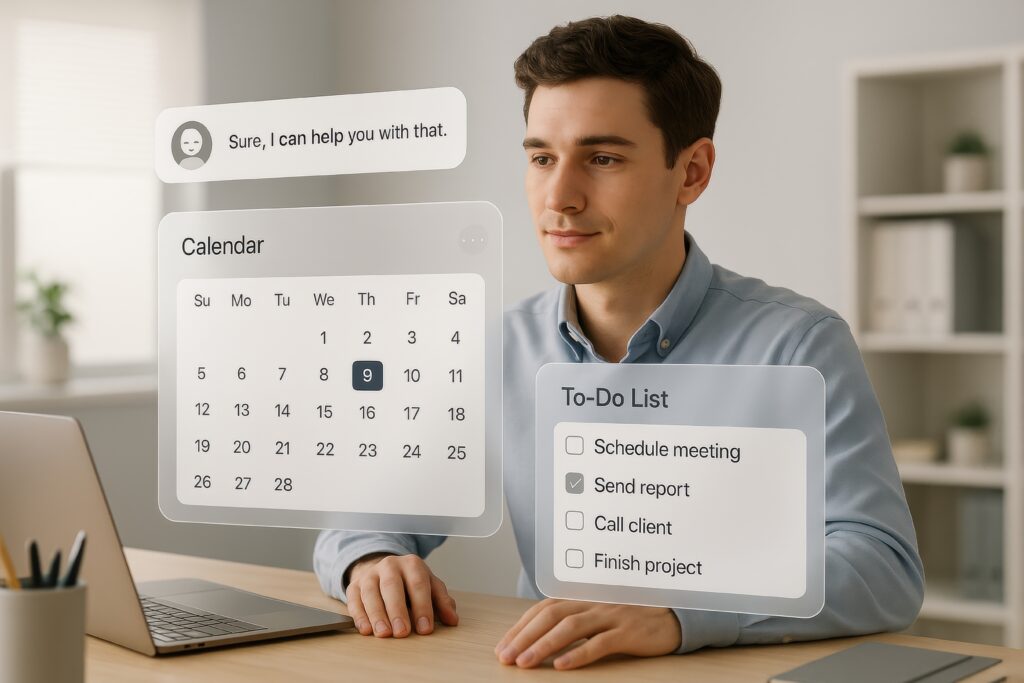Simple ways to work smarter, stay organized, and save time—without feeling overwhelmed by technology
Artificial intelligence isn’t just for tech experts or business teams. It’s increasingly becoming part of everyday life—and when used intentionally, it can be a powerful tool for getting more done with less effort. Whether you’re juggling a busy household, trying to stay on top of personal goals, or simply tired of forgetting things, AI can quietly make your life easier.
Here’s how to use AI in smart, non-intimidating ways to boost your personal productivity and free up your time for the stuff that really matters.

1. Automate Your To-Do List
Apps like Todoist, Notion AI, and Google Tasks with AI support can help you organize your tasks automatically, prioritize them, and remind you when something is slipping through the cracks. Some AI tools can even generate daily schedules based on your calendar and suggest the best time blocks to tackle each item.
Why it helps:
You spend less time organizing your list and more time actually getting things done.
2. Use AI to Meal Plan, Budget, and Shop Smarter
Planning meals and staying on top of your finances are two of the most time-consuming personal chores. AI tools like Mealime, Yummly, and Cleo can generate grocery lists, suggest recipes based on what’s in your fridge, and offer budgeting advice based on your spending habits.
Why it helps:
You eliminate decision fatigue and streamline your weekly routines—without doing the mental heavy lifting yourself.
3. Summarize and Learn Faster
If you’re trying to keep up with news, podcasts, or books, AI tools like Perplexity, ChatGPT, or YouTube summarizers can break down content into digestible highlights. Want to learn something new? Ask for a step-by-step explanation or quiz-style review to retain it better.
Why it helps:
You stay informed and grow your knowledge in less time—with less burnout.
4. Manage Your Inbox (and Responses) Efficiently
Email overload is real. AI tools like Gmail’s Smart Compose, Superhuman, and browser plugins like Shortwave can draft replies, detect priority messages, and even summarize email threads. If you often ghost emails because they’re mentally draining, this is a game-changer.
Why it helps:
You spend less time dreading your inbox—and more time clearing it.
5. Create Personal Journals, Notes, and Reflection Prompts
Apps like Reflectly, Day One, and Notion AI can help you build a consistent journaling practice with helpful prompts, automatic summaries, or wellness check-ins. You can even use AI to reflect on patterns in your moods or goals.
Why it helps:
Self-awareness increases without requiring you to sit in front of a blank page and wonder where to start.

6. Use AI as a Thought Partner
Need to brainstorm ideas for a gift, write a heartfelt message, plan a vacation, or solve a daily annoyance? AI chatbots like ChatGPT or Claude can act like a digital sounding board. Just ask a question or describe your problem—and watch ideas flow.
Why it helps:
It reduces mental clutter and gives you an instant second brain when you’re stuck.
7. Optimize Your Daily Routine
AI scheduling apps like Reclaim, Motion, or Clockwise can automatically rearrange your tasks around energy levels, focus times, or unexpected interruptions. Whether you’re managing school pickups, errands, or personal creative projects, these tools adapt to your real-life rhythm.
Why it helps:
It puts your day on autopilot—so you don’t have to keep recalculating how to get everything done.
Final Thought
AI isn’t here to replace your routines—it’s here to refine them. With a few smart tools and a little curiosity, you can use AI to reduce decision fatigue, organize your life more efficiently, and create more space for rest, creativity, and joy.
Start small. Choose one area of your life where things feel chaotic, and let AI help you smooth it out. You might be surprised at how much lighter your day feels.

